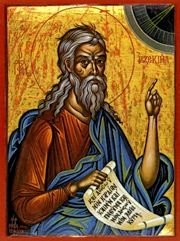more ignorant religion journalism
From Carl Keating's Jan. 29th e-letter [www.catholic.com ]:
UNBIASED AND UNINFORMED
The Religion News Service [http://www.religionnews.com/ ] describes itself as "the only secular news and photo service devoted to unbiased coverage of religion and ethics--exclusively." These words imply that RNS gets the facts right, whereas competing services (which are not secular and thus are hampered by denominational affiliations) are biased.
Well, maybe such services do have a bias, but I suppose it depends on what you think is the greater failing, toeing a denominational party line or not knowing what you're writing about.
Consider an RNS story written by Daniel Burke in September of last year. The headline was "Archbishop Heats Up 'Wafer' Wars." The Archbishop in question was Raymond Burke of St. Louis.
The story began this way:
"A hard-line U.S. Roman Catholic archbishop is urging ministers to deny Holy Communion to politicians who support abortion rights, arguing that it's a 'mortal sin' to offer the sacrament to 'the unworthy.'"
Right off, I see bias in the unbiased RNS report: "hard-line." Would the story have lost anything, other than a tilt, if that term had been absent? But let's go on. The third paragraph is the one I'm interested it. It read this way:
"Now, the conservative cleric is invoking the church's highest punishment--mortal sin--to convince the lay and ordained Catholics who distribute Holy Communion at Mass to safeguard the sacrament."
Daniel Burke tried to explain the instructions that Archbishop Burke issued to those under his authority:
"Drawing on the works of the late Italian Jesuit scholar Felice Cappello, Burke says those ministers are 'held, under pain of mortal sin, to deny the sacraments to the unworthy.'"
To me, this means that if those ministers disobey the Archbishop and knowingly give Communion to "the unworthy," the ministers themselves commit a mortal sin. But that’s not quite how Daniel Burke understood things. Let's go back to that third paragraph, where he referred to "the church's highest punishment--mortal sin." Have you ever read it explained that way? I had been under the impression that the Church's highest punishment was excommunication--or maybe interdict, if the Church wanted to levy a widespread punishment. I never read about mortal sin being something the Church slapped on you for being disobedient.
Mortal sin is something you bring on yourself. It's something you do, not something the Church does to you. Mortal sin is not itself a punishment or some kind of judicial decree, but there are punishments associated with it, the chief being going to hell if you die unrepentant (a fairly stiff penalty, I'd say).
Daniel Burke doesn't know what he's talking about. To call mortal sin "the church's highest punishment" is to say, at least to knowledgeable Catholics, "I don't understand the basics of your religion."If that is the case, why is he writing about our religion at all?
Labels: abortion, Catholics in the Public Square, media


<< Home